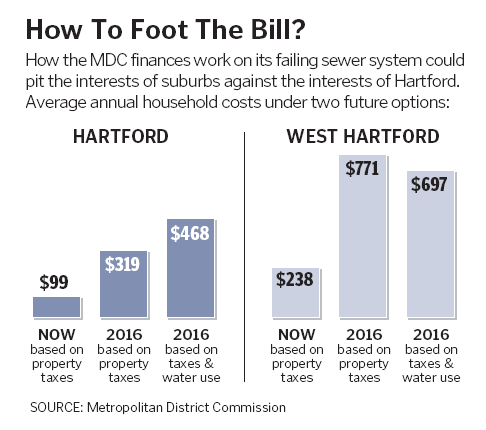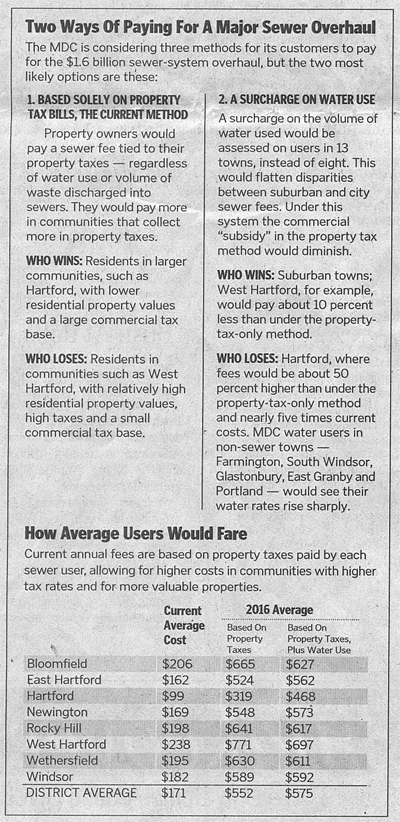 |
 |
|||
|
||||
| Web Sites, Documents and Articles >> Hartford Courant News Articles > | ||
|
Voters Asked To Buy $1.6 Billion Pig In A Poke MDC Sewer Upgrade Sketch Lacks Bottom-Line Details October 21, 2006 Voters living in the regional sewer authority's eight member towns are being asked to decide the fate of a $1.6 billion sewer upgrade project to fix what agency officials describe as a "massive" environmental and public health crisis. But voters in Hartford, West Hartford, East Hartford, Newington, Wethersfield, Rocky Hill, Windsor and Bloomfield are going to have to decide whether to say "yes" or "no" without knowing exactly how much of the total bill is going to come out of their pockets.
The discussion revolves around three methods: Linking the charge to local property taxes, adding an annual assessment to all MDC water customers or basing the cost on sewer use. The project, under any circumstances, is expected to lead to sharply higher annual payouts - but the hit could vary widely from one town to another, depending on which system is ultimately chosen.
Under the property tax method, for example, an average household in Hartford would pay $319 by 2016, while a West Hartford family would pay $771, MDC estimates show. But the burden would shift if MDC water customers ended up subsidizing the project. In that case, a Hartford family in 2016 would pay $468, while a West Hartford household would pay $697. The sewer use system, which has few fans, would end up hitting residential customers the hardest, with an average annual payout of $860 by 2016. "The unfortunate thing about this is that the voter is going to be asked to vote on something and all the details haven't been worked out," said Jeff Wright a commissioner from Newington who sits on the MDC's 29-member board. "It's like we are saying, `Buy this house now and we are going to work out the details later.'" MDC officials said they came up with the new options in response to requests from member towns who wanted an alternative way to pay for the project. Officials said they would have liked to resolve the matter before the referendum, but federal and state mandates have forced the vote's timing. The underlying problem is that during about 50 heavy rains a year, untreated sewage overflows into the region's rivers and the city's streets from pipes too old, too small and too few to handle the volume, agency officials said. At times, more than 300 basements in MDC member towns have flooded with raw sewage, officials said. The problem is worst in Hartford, Wethersfield, Rocky Hill, Newington and West Hartford. The overflow also pollutes the Connecticut River and tributaries and Wethersfield Cove. Both the state Department of Environmental Protection and the federal Environmental Protection Agency have ordered the MDC to fix the problem. The 15-year project, which has seen its scope and cost expand since the original 2004 estimate of $670 million, would repair and upgrade the overburdened system. On Nov. 7, voters in the eight MDC towns will be asked to approve $800 million in borrowing to underwrite the cost of the project. Two more referendums are expected to follow - one for $500 million in about 2012; another for $300 million in about 2018, officials said. MDC officials say they will also seek federal and state grants to help defray the cost. The work is to include expanding the Hartford sewage treatment plant and digging up 80 miles of roadway in Hartford - and possibly 40 more miles in neighboring towns - to separate pipes for water runoff and sewage. The MDC also will fix cracks in sewage pipes that let rain water in, enlarge pipes in certain areas and build underground storage tunnels to hold excess sewage and rain water until the treatment plant is ready to process it. The project's scope has expanded to increase the treatment plant's ability to remove nitrogen from the effluent that is dumped into the Connecticut River. Too much nitrogen in the river can affect plant and animal life dramatically, officials said. But while few argue about the necessity of the repairs, the high cost has led to discussion among member towns over how to split the price tag. Those discussions have led to the development of three possible scenarios. In the first method, the MDC would continue using a system the agency has used for years to cover its operating and maintenance costs, which bases payments on a member town's property taxes. In this system, homeowners in towns such as West Hartford - with higher residential property values, higher spending on services such as schools and a relatively small commercial tax base - end up paying more for sewer use. In Hartford - with lower residential property values and a larger commercial tax base - homeowners end up paying less. This disparity - as well as the effect the project's high cost would have on each town's budget - has prompted a vigorous debate about whether the property tax-based system is the most equitable way to spread out the $1.6 billion. "It has been a problem for us for a long time," said James Francis, town manager in West Hartford. "And when you add $1.6 billion on top of that, the problem multiplies in our mind. What it does is it makes the tax burden unbearable for us. At the end of this project, the MDC payment would be at least half of what the whole town side of our budget is." On the other side of that debate are officials in Hartford. Lee Erdmann, the city's chief operating officer, said that Mayor Eddie A. Perez is still waiting for more data from the MDC, but is concerned about the prospect of Hartford getting hit hard. "He is very concerned that this is likely to shift cost to Hartford residents, and we have the poorest residents in the region," Erdmann said. "If there is an odor from the treatment plant, you can't smell it in Bloomfield," he said. "I think the amount of benefit to Hartford should be increased. Not just in lower taxes, but in getting its fair share for bearing the actual and potential risk that the surrounding suburbs don't bear." The $1.6 billion capital project would then be covered by a "Clean Water Surcharge" the MDC would tack on to water-user bills in its eight member towns, as well as the five other towns that get MDC water: Farmington, South Windsor, Glastonbury, East Granby and Portland. This system would require approval from the state legislature. MDC water customers currently pay $1.84 per 100 cubic feet of water they use. The new water charge would cause that figure to more than double within the next 10 years. The fee would be added in increments of 50 cents per 100 cubic feet every two years, reaching a $2 increase over the next 10 years, officials said. Using this system, the disparity between what households pay in the MDC's suburban towns and what residents pay in the city of Hartford is lessened, and other towns would help shoulder the cost. But Susan Bransfield, Portland's first selectwoman, said the idea of charging her town when it does not use the MDC's ailing sewer system is "grossly unfair." Portland buys water from the MDC for nearly 5,000 homes, but the town has its own sewers and treatment plant. "We can't tolerate that," Bransfield said. "For us to pay for the sewage treatment plant and repairs they need to build seems to me highly inappropriate and it is definitely something I would have to protest and fight...You can't balance that bill on the backs of Portland residents." MDC officials say that it's fair to ask other towns to help with the costs because everyone in the region benefits from cleaner rivers. But Bransfield argues that Portland already pays for its own sewer system to ensure the water it dirties is returned clean to the river, she said. And because Portland residents would not be allowed to vote on the $800 million referendum, charging them for the project would be "taxation without representation." The third system being considered is a fee based on how much a household uses the sewers by flushing toilets, taking showers or doing laundry. This method would increase a homeowners bill immediately by 30 percent, according to MDC officials, because it would eliminate any tax subsidy received from a town or city's commercial entities. Because this system would lead to even more drastic increases for homeowners, it is getting little traction. What the MDC will do if the referendum fails is unclear, but agency officials said there are several possibilities. The federal government could simply take over the process, forcing the project to move forward without local oversight, or it could take the MDC to court to enforce the mandate and begin fining the local agency each time the sewer system overflows. The MDC also could push for legislative approval from the state to change the agency's charter, which now restricts the MDC from starting projects in excess of $5 million without a referendum.
|
||
| Last update:
September 25, 2012 |
|
||
|


